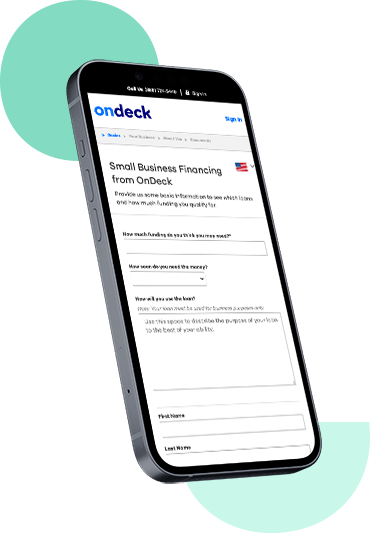
What is a microloan?
Microloans are small business loans for lower funding amounts — typically under $50,000. They’re often used by entrepreneurs with limited credit histories as a way to start or grow a business. Microloans can be helpful for everything from purchasing equipment to covering cash flow gaps.
For borrowers with limited credit access, microloans can be a good way to qualify for small business funding. Their small size can help increase the chances of approval, and many microloan lenders have more flexible eligibility requirements. Microloans are available from a number of sources. This includes banks, peer-to-peer lenders, online lenders and the Small Business Administration’s microloan program.
OnDeck regularly works with borrowers with funding needs below $50,000. Both of our options for small business financing — term loans and lines of credit — can be used for smaller funding amounts.
Funding options for your business needs — from micro to macro.
OnDeck Line of Credit
A revolving credit line you can draw from 24/7 to receive funds within seconds.*
- Credit limits from $6K - $200K
- Flexible repayment terms of 12, 18 or 24 months
- Great for keeping funds on hand
OnDeck Term Loan
A one-time lump sum of cash with an eventual option to apply for more.
- Loan amounts from $5K - $400K
- Repayment terms up to 24 months
- Great for larger investments in your business
Benefits of financing with OnDeck.
No hard credit pulls
Check your eligibility without affecting your credit score.
Fast funding
Lines of credit can fund instantly.* Term loans can fund the same day.†
Build business credit history
We report to business credit bureaus, which helps build business credit history with on-time payments.
Do you meet our minimum requirements for a microloan?**
1 Year
in business
Business
checking account
$100K
business annual revenue
625
personal FICO® score


How to apply for smaller funding amounts with OnDeck.
-
Step 1
Complete the application.
Our streamlined process is designed to be completed in just minutes.
-
Step 2
Get a decision.
Work with an expert loan advisor to choose the best option for you.
-
Step 3
Receive your funds.
Sign your contract and get funds as soon as the same day.†
Learn more about microloans.
A microloan is the same as a normal loan, just for a smaller amount. Most lenders agree that any loan under $50,000 is considered “micro.” They can be used for the same things as other loans such as expanding inventory, covering operating costs and investing in growth.
Microloans work the same as other small business loans. You’ll receive either a credit limit you can draw from or a lump sum of cash up front. You’ll pay the loan back plus any interest and fees according to an agreed upon schedule over a set period of time. They often have shorter term limits than other small business loans (under 10 years).
All lenders — microlenders or otherwise — will have minimum requirements for the applicant to meet. At OnDeck we look at business fundamentals like cash flow, time in business and other factors to help us determine loan terms like repayment terms and interest rates.
Microlenders can offer access to capital for small businesses that might have difficulty finding funds from other sources.
Far too often, small businesses aren’t served well by traditional lenders — making alternative lenders an important part of the small business lending landscape.
Nonprofit microlenders focus on small businesses that have the potential to make an economic impact in their community, or businesses that can leverage a small loan to make a big difference.
These nonprofit microlenders often offer favorable loan terms with very low or even no interest, along with advice and mentoring to help business owners build successful companies.
The U.S. Small Business Administration (SBA) microloan program helps small businesses access loans up to $50,000. They do this through nonprofit community based-organizations that have experience in lending and they often offer management and financial assistance to borrowers. According to the SBA, the average loan amount in the SBA microloan program is about $13,000.
SBA microloans can be used for working capital, inventory, machinery and equipment. Repayment terms and interest rates can vary depending on the intermediary lender and the needs of the small business borrower. The maximum repayment term allowed for an SBA microloan is six years and interest rates can be between 8% and 13%, as stated on the SBA website.
Federally licensed Community Development Financial Institutions (CDFIs) access private and public funds when lending to small business owners. And, as their name implies, they focus on businesses that have the potential to impact developing communities and low-income borrowers.
These can include recovery centers and other types of healthcare businesses as well as multifamily housing providers that offer on-site community services. Funding from CDFIs is primarily intended to provide financial opportunities to small businesses underserved by traditional banking institutions.
CDFIs can range from both community development banks and credit unions to nonregulated sources like loan and venture capital funds. The type of microloan program, as well as the interest rates and loan terms that are offered, can depend on the institution. Nonetheless, CDFIs can be a good option for small businesses that are looking to make a positive difference in their local neighborhood.
The short answer is no. There are a number of reasons a small business owner might decide to pursue a microloan or apply for a microloan program. In some cases, small business owners may need financing to cover temporary cash flow gaps and find that a microloan best suits their purposes. Microloans can also offer competitive interest rates, which may be more appealing to certain borrowers.
For instance, microloan programs like the one offered by the SBA can provide loan terms and interest rates that may make repayment more manageable for small business owners. While interest rates and loan terms can differ widely among microloan programs, they are generally designed to help small businesses expand, rather than simply aid those who have trouble with repayment. In fact, funding from the SBA microloan program can’t be used to pay off existing debts, so microloans aren’t necessarily intended for borrowers with poor credit history.
In some circumstances, many microlenders may be willing to work with startups that a bank may potentially shy away from, as well as small business owners who may not meet the business lending criteria of a traditional lender. For example, in some states, only consumer microlenders may offer the smaller loan amounts that a business owner needs.
Many nonprofit lenders have working relationships with local banks that want to maintain their deposit relationships, but aren’t able to provide a small business loan to business owners. Borrowers who might be looking for a $3,000 or $5,000 loan might be pushed into opening a credit card for these smaller amounts at a local bank. However, that very small loan amount, in the right hands, has the potential to create jobs, build a business and strengthen a community. In other words, even very “bankable” businesses may qualify for a microloan from a nonprofit lender.

